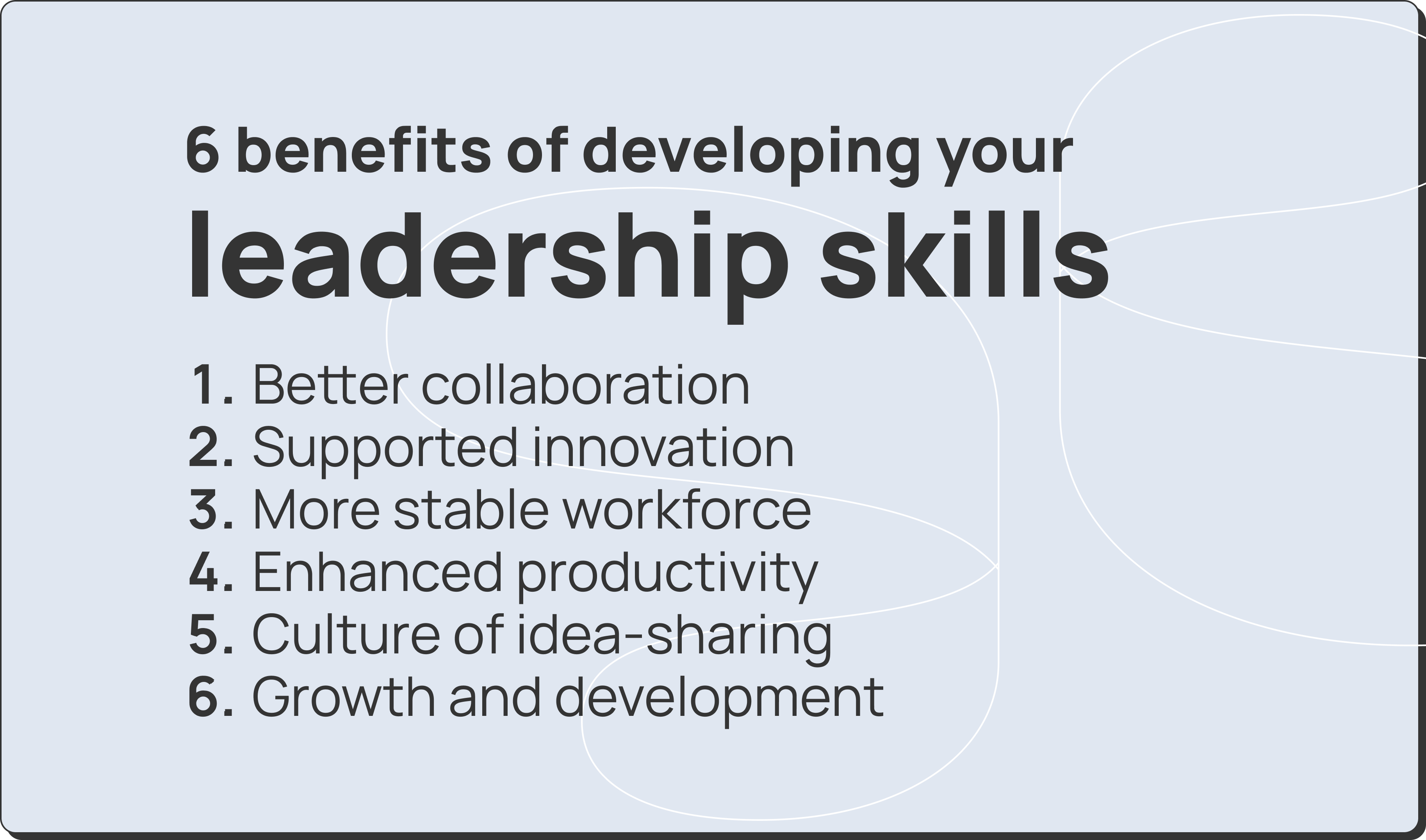What makes a great leader? It’s not just about making decisions, managing performance, setting direction, or having a title—it’s about inspiring and guiding your team toward a common goal with confidence and empathy.
Strong leadership skills can unlock tremendous potential for yourself and your team, whether you manage a team, lead a project, or help others succeed.
Great leaders aren’t simply born—they’re made. With the right mindset and commitment, anyone can develop and improve their leadership skills.
These abilities drive success, foster collaboration, and create positive work environments. So, what are leadership skills, why do they matter, and how can you cultivate them to elevate your leadership journey?
What we mean by leadership skills
Leadership skills are the ability to influence, guide, and direct others effectively to achieve a shared goal or a set of goals. These skills are vital in any team.

The importance of leadership skills is now universally acknowledged. Some of the key leadership skills include effective communication, adaptability, decision-making, conflict resolution, confidence, emotional intelligence, negotiation, reliability, being able to motivate others, facilitating up-skilling, the ability to understand and develop team dynamics.
Effective communication builds strong relationships and achieves goals
Clear communication is the base of good leadership. It ensures everyone is aligned and working together to achieve the common goal. This implies that a leader must communicate and listen to team members to understand their perspectives.
"By actively listening to their concerns and showing appreciation for their hard work, I built trust and boosted morale. This experience taught me that leadership isn’t about giving orders but inspiring others to do their best." - Jason Jones, Owner, ATX Epoxy Floors
Conflict resolution focuses on finding fair solutions to disagreements
Conflicts are a part of work life and can arise in any circumstance. A leader should be able to resolve conflicts and maintain a healthy work environment.
Fair negotiation helps reach agreements
Negotiation skills include collaborating with the team or external stakeholders to find a solution that benefits everyone, managing emotions and tension, and ensuring everyone feels heard and valued.
Reliability shows others you can be dependable and consistent
Reliability and trust are the key elements in all relations, from family to workplace, which can bring success. A true leader must keep their word and be consistent regardless of the situation.
Adaptability helps you be resilient when faced with adversity
Circumstances change, and change is inevitable. A leader must be flexible in adapting to changing circumstances and, accordingly, changing strategies. Supporting teammates during stressful changes can instil confidence in leadership.
Decision-making should include different perspectives
A strong leader should be an effective decision-maker. Decision-making is about selecting the best option from among the available alternatives. To avoid unconscious prejudice, it’s important to be clear about your decision, understand what you can achieve, and be open to all practical options. Involving others with different perspectives helps us make the best decision.
Confidence doesn’t exclude vulnerability
Confidence is crucial for performance and leadership, as it’s the ability to be confident about our skills and competencies and in our peers and team. Leaders need to take risks to achieve shared goals. But confidence alone isn’t enough. Vulnerability helps us connect with others and identify our blind spots.
Emotional intelligence isn’t simply the ability to identify emotions
Emotional intelligence is the ability to manage our emotions and help others navigate theirs. In other words, emotional intelligence, also known as emotional quotient (EQ), helps us understand others’ way of experiencing the world.
"Understanding and managing your emotions, as well as recognizing and influencing the emotions of others, has been key to navigating complex situations and building trust with my colleagues." - Jon Morgan, CEO & Editor-in-Chief, Venture Smarter
Why leadership skills matter for people managers
A people manager manages and supervises a team of employees. They motivate, engage, and coach their teams to achieve company goals.

A good people manager leads by example, focusing on their team’s performance, engagement, and well-being. They must also be good problem solvers, capable of resolving disputes and guiding their teams to reach the required results and improve their careers.
Leadership skills are essential for a people manager because they can help a company and team succeed or fail. When a people manager has strong leadership skills, they can:
- Enhance productivity
- Facilitate collaboration
- Contribute to a stable workforce
- Promote growth and development
- Have more effective communication
- Foster a culture of idea-sharing supporting innovation
Why leadership skills are also relevant for peer leaders
Peer leaders don’t always have an official title—often, the best leaders don’t. They’re essentially emerging leaders, and this could be the beginning of their leadership development. Peer leaders help create a workplace that supports well-being and productivity.
Additionally, they can identify gaps between leadership and, therefore, support their colleagues. Some other qualities of peer leadership include observational skills, positive thinking, empathy, active listening, authenticity, flexibility, and reliability.
"The confidence and trust I’ve built with my colleagues have opened doors to leadership roles I never expected, proving that leadership is not just about directing but inspiring others to succeed alongside you." - Andrew Wilson, Owner, Tulsa Concrete Contractors
Why leadership skills are important in hybrid and remote teams
Remote leadership is a modern approach to overseeing employees working remotely from home, in various locations, or in hybrid work arrangements. When effectively implemented, it can enhance collaboration and boost productivity. In addition, it helps increase job satisfaction among remote workers.
On the other hand, bad collaboration leads to an unhealthy environment, which negatively impacts shared goals. Therefore, remote leadership is essential. It ensures the smooth flow of the workflow and makes the team connected, engaged, and productive.
Practical tips to enhance your leadership skills
Ready to sharpen your existing leadership skills? Here are some actionable tips to help you improve:
1. Develop emotional intelligence
Emotional quotient (EQ) measures one’s emotional intelligence. EQ is vital for leadership skills and helps manage relationships more effectively with one’s emotions and those of others. It has four key aspects: self-awareness, self-management, social awareness, and relationship management.
"This focus on emotional intelligence resulted in a 20% drop in turnover within the first year and significantly improved morale. People need to feel valued to perform at their best, and showing empathy has become one of my strongest leadership tools." - Chris Bajda, E-commerce Entrepreneur & Managing Partner, Groomsday
Self-awareness
Self-awareness is the key to analysing your emotions, strengths, and weaknesses.
One of the major tasks for leaders is making decisions, and being aware of the impact of emotions can help you make decisions more thoughtfully. Identify your strengths and continue developing them.
In terms of weaknesses, self-awareness helps you recognise and manage them effectively, supporting healthier relationships and a more balanced leadership.
Proactivity and self-management
Self-management is the ability to control your emotions in high-pressure situations.
One of the qualities of a good leader is to remain calm and be patient in the decision-making process, even under stress. You should engage in positive talks and reframe negativity into learning opportunities. Practising self-discipline is also another effective way to self-regulate.
Social awareness
Social awareness allows leaders to see things from others’ perspectives and genuinely understand their feelings.
A true leader is invested in the well-being of others and shows compassion for their losses, whether in professional or personal contexts. Good leaders foster open communication, listen attentively, and actively practise empathy, building confidence and trust within their team.
Relationship management
Relationship management relates to your ability to influence, coach, and mentor others while efficiently resolving conflicts.
Tips to develop your emotional intelligence
- Develop self-awareness by analysing your feelings and how they affect your ideas and behaviour.
- Develop empathy by active listening and trying to learn about their perspectives and emotions.
- Develop active listening to get rid of distractions and focus on the speaker.
2. Include leadership training in your professional development
Learning and development are always excellent opportunities to develop skills in a structured environment. One of the most significant benefits is that they can help improve employee performance and productivity.
Leadership training is essential for developing the skills needed to manage teams, make decisions, and achieve organisational goals. Here are some common types of leadership training:
Professional coaching and mentoring programs
These programs provide personalised guidance to help individuals improve their skills and achieve career goals. Coaching focuses on specific areas of growth, while mentoring involves a more experienced individual offering advice and support.
For example, a new manager receives coaching to improve their communication skills and mentoring from a senior leader to navigate career challenges.
Structured education and training programs
These programs offer a formal, organised approach to skill development through courses, workshops, and certifications. Participants follow a curriculum that covers key leadership and professional skills.
As an example, a company offers a leadership training program with online modules, in-person workshops, and assessments to enhance decision-making and team management skills.
Action learning
Action learning involves solving real-world problems while learning new skills. Participants work together to address challenges, applying what they learned from their real-life situations.
For example, a group of managers collaborates to improve employee engagement in their company, using their leadership knowledge to address issues and learn through the process.
Tips when planning your leadership training
- Focus on specific skills. Before attending a workshop or training, it’s highly recommended to identify the specific areas that you want to improve.
- Active participation during training. Participating in activities like group tasks, discussions, and asking questions will help you develop leadership skills for real-life situations.
- Implement the newly acquired skills. Create an action plan to integrate the new skills into your daily leadership practices.
3. Learn from mistakes and move on
Mistakes are a part of life. Anyone can make mistakes, and sometimes, they’re inevitable. However, learn from mistakes and consider them valuable opportunities to gain experience. Don’t get stuck with the past—what matters is moving on to the present.
Tips for making the most out of mistakes
- Consider each mistake as an opportunity to gain experience. Remember, nobody’s perfect. Each mistake gives you an experience of improving next time, so consider all the mistakes as learning opportunities and move on rather than thinking about failures.
- Analysing your mistakes. Analysing errors regularly helps avoid repeating the same mistakes and creates a systematic approach to progress.
- Forgive and focus. Thinking about mistakes and producing unnecessary tension does nothing good. Instead, forgive yourself and others and focus on goals that empower you.
Ready to boost your leadership skills?
Leadership isn’t just about managing tasks—it’s about inspiring and empowering others to succeed, as well as making sure your team achieves their goals. Whether leading a team in a traditional office setting or managing a remote workforce, honing your leadership skills can make all the difference.
If you’re looking for tools to enhance your leadership in hybrid or remote environments, try Ayda Insights. Our platform uses AI-driven insights to help teams collaborate better, and leaders make more informed decisions. With the right tools and mindset, you can unlock your leadership potential and inspire success in every situation.
About the authors
Darja is a Behavioural Scientist and Customer Success Manager. She holds a Master’s in Social Sciences from the University of Helsinki, specialising in business anthropology and organisational psychology. She is also working on service and product development.
Pooja specialises in developing content that enhances leadership skills and promotes effective team management. With a strong focus on personal growth and organisational success, she’s passionate about exploring strategies that empower leaders to inspire, motivate, and guide their teams toward achieving common goals.
%201.png)


